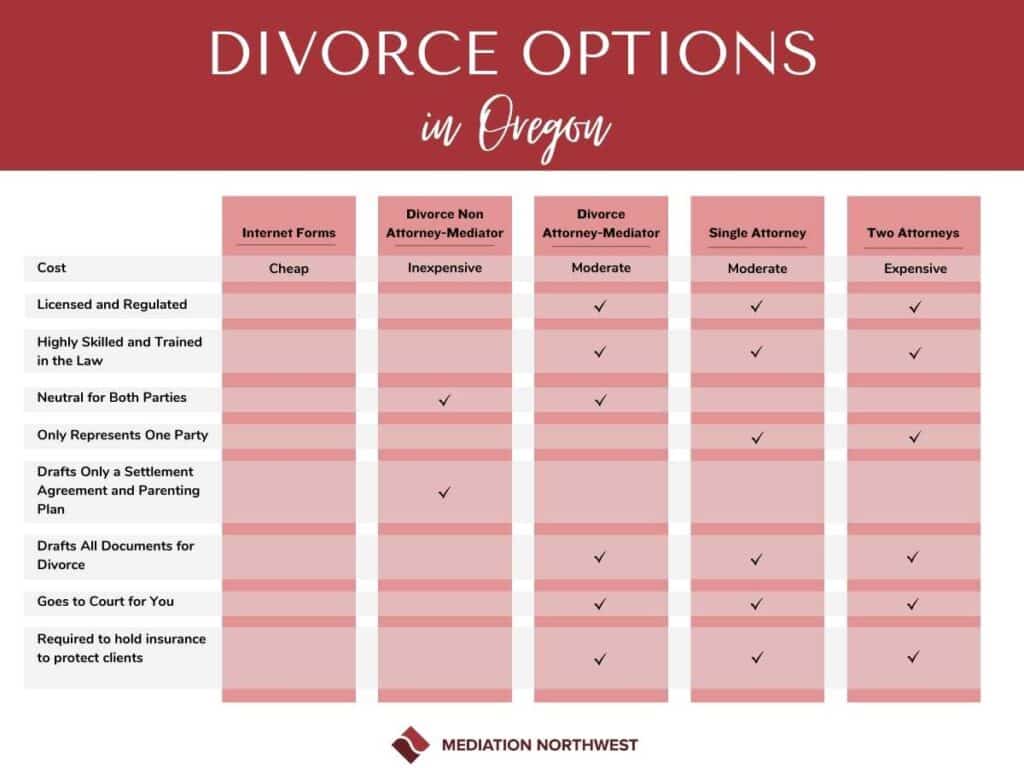There are five ways to get a divorce in Oregon. Each option has pros and cons. Keep reading to discover which way to get a divorce in Oregon is best for you.
Using Forms
You can use forms from your local circuit court, the Oregon Judicial Department, or from the internet.
The obvious advantage of this option is that it is cheap. No one has a divorce savings account. Most couples either pay for their divorce on their credit cards or borrow from family. So, the cost of this option is extremely appealing to many folks.
There are so many disadvantages to using forms. If you have liabilities, you must correctly draft for those liabilities so that you are not responsible for your former spouse’s car loan, etc.
If you have kids, the child support rules and the parenting time rules aren’t easy to navigate.
If you and your spouse are not in agreement on everything, you will need to navigate the court process in a contested divorce, which is not easy. Even attorneys get frustrated with all of the bureaucratic requirements of the court system.
These forms are meant for super simple situations and do not have the ability to customize to your situation.
If you (1) don’t have joint assets and don’t want anything from the other’s assets, (2) don’t have joint liabilities, (3) don’t have kids, (4) both agree to not request spousal support, and (5) agree to all terms, then you can use forms without much downside.
Non-Attorney Divorce Mediator
Fun fact: In Oregon, anyone can call themselves a “divorce mediator.” There is no licensing or regulation for the title, “divorce mediator.” My 17-year-old son can market himself as a “divorce mediator.” Yep! Calling yourself a “divorce mediator” means absolutely nothing.
I am sure you are thinking, ‘there must be a way to ensure that a non-attorney “divorce-mediator” provides a quality service and hasn’t drafted documents harmful to clients? You know, market forces and the like?”
The answer is a big fat NO.
Non-attorney divorce mediators can (and do) draft documents harmful to their clients again and again and again. And because there is no licensing or regulations preventing it, you are not protected from it.
As a former law professor of mediation, I have been presenting at national conferences on mediation for over two decades. I cannot tell you how many non-attorney “divorce mediators” ask me questions that make my stomach fall. They are clueless to their knowledge gap.
They also can’t shepherd your divorce through court, which means if you use a non-attorney divorce mediator, be prepared that you will also need to: (1) hire a paralegal to prepare the remaining divorce documents, (2) navigate the court system on your own, and (3) pay the court’s filing fees.
Frankly, in my opinion, there is never a good reason to use a non-attorney divorce mediator.

One Attorney
Boring (but very important) fact: Attorneys can only represent one party, which means if the husband hires the attorney, then the attorney is legally required to do what is best for the husband, regardless of how it affects the wife. While the husband is cozy and protected, the wife is hanging-out in the wind.
Using one attorney is generally the same cost as using an attorney-mediator.
I have found that solo attorneys use a lot of bait and switch tactics when quoting fees. For instance, attorneys love to quote, “Just put down a $3,000 – $5,000 retainer and I’ll keep the costs down.”
Most divorce attorneys start at $400/hour. At the minimum, they need to conduct discovery, negotiation, draft 10-15 documents, and present it to the court. I’m not great at math and even I can determine there is no way $3,000 is ever happening. Classic bait and switch.
If the non-represented party isn’t in full agreement to the one-sided agreement drafted by the attorney, and has the audacity to say, “No,” then the cost of the divorce just went up, up, up and will definitely eat-up the costs of the “I’ll try and keep the costs down” retainer.
I cannot think of a single reason why I would ever recommend using a single attorney for a divorce.
So, if you’re keeping score: forms are a, ‘maybe,’ depending upon your situation, and either a non-attorney divorce mediator or a single attorney is a, ‘firm no.’
Two Attorneys
Without any equivocation, hiring two attorneys is the safest process for both parties. Unfortunately, also without equivocation, it’s the most expensive divorce process.
Parties end-up tapping into their retirement or their home equity to pay for their attorney. Now, times that by two. It’s such a sad situation.
If your spouse is harmful to you or the kids, or is ridiculously unreasonable, then you need to hire an attorney; and, thus, the expense is justified and necessary. But, if your spouse is a good parent and you can eventually make reasonable decisions together, don’t hire two attorneys to aggravate the situation and cost you a combined 40K in the process.
Attorney-Mediator
I am an attorney-mediator, so I am partial to the service that I offer. But, guess what? I tell half of those who consult with me about my services that they could just use the forms or that they each need to hire an attorney.
I think of the attorney-mediator option as the Goldilocks’ option – it’s just right (most of the time).
We are highly skilled and highly trained. We know the law. We are licensed and regulated. We can navigate the court system for you. We are neutral, which means we equally call balls and strikes. We know the secret language your documents need. We see (and inform you of) the unintended consequences of your decisions. We cost 2/3rds less than two attorneys! We have zero incentive to aggravate the situation between you and your spouse.
Our goal is to get you a divorce on YOUR terms, quickly and mindfully without unintended consequences and without breaking the bank.
Related: Divorce mediation checklist.
So, now that you can appreciate the skills an attorney-mediator brings to the table, it does cost a little bit of money, but it doesn’t break the bank. It’s the difference between getting a frozen meal that you cannot customize at all (i.e. forms) and getting a fresh hot meal minus the cilantro, but adding lemon, from a local restaurant. It costs more than the frozen meal, but not as much as a Michelin starred restaurant (i.e. two attorneys). It’s the perfect Goldilocks’ porridge.
The single difference between a solo attorney and an attorney-mediator is that although attorney-mediators are “attorneys,” we don’t act as an attorney during the divorce process. We don’t represent either party. We are neutral. We only act as an attorney when we file the paperwork with the court. Although the difference is subtle, it is extremely important.
For example, let’s presume that the wife is awarded the house, and that both parties’ names are on the mortgage to the house. The wife hired an attorney to handle the divorce and the husband crossed his fingers that everything would work-out and didn’t hire an attorney. The wife’s attorney is not going to inform the husband that he needs to demand that his name is removed from the mortgage because it will cost the wife $8,000 to refinance the property into her sole name. As a neutral, I am going to explain each option, and the advantages and disadvantages of each option, to both parties. The difference is that the neutral attorney-mediator told the husband about the problem and the potential solution, but the wife’s attorney had the ethical obligation to keep their mouth shut because it benefited their client, the wife.
Click here to download a free copy of Divorce Without Drama.
Final score: forms are sometimes a ‘maybe’ depending upon your situation; non-attorney mediators and single attorneys are a “firm no”; two attorneys are sometimes necessary; and an attorney-mediator is the Goldilocks of divorce options – just right (for most).



